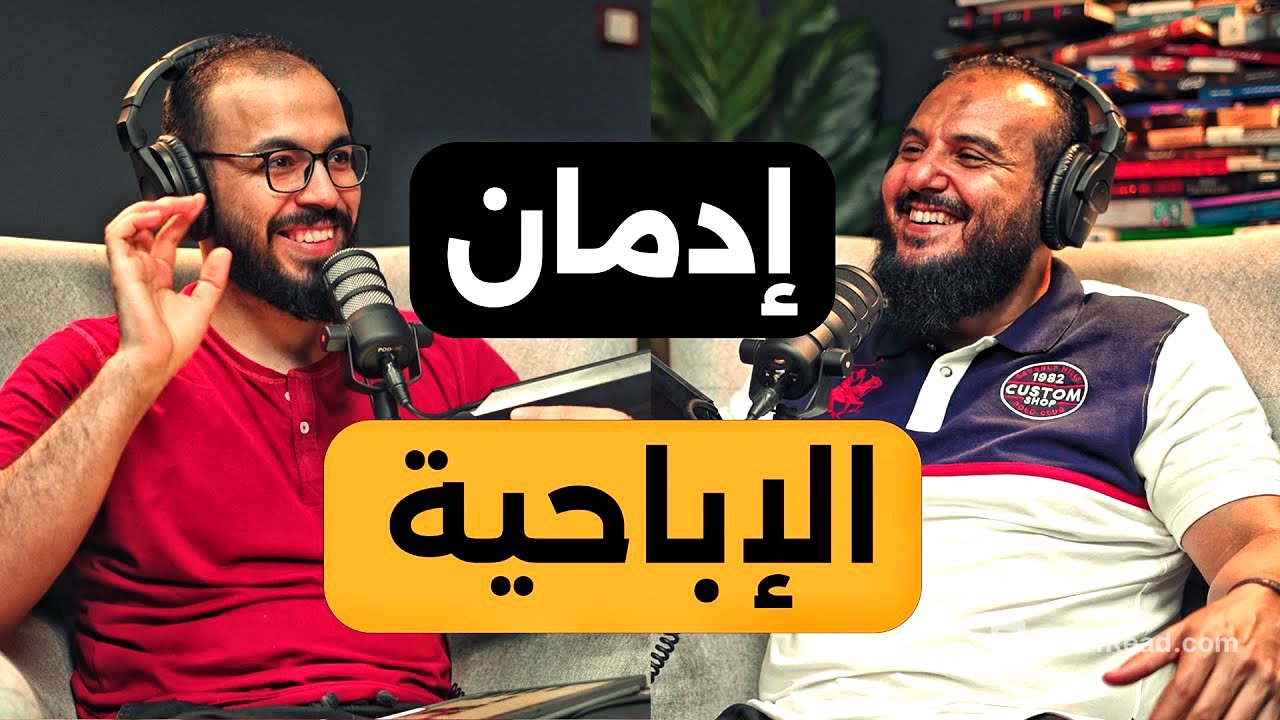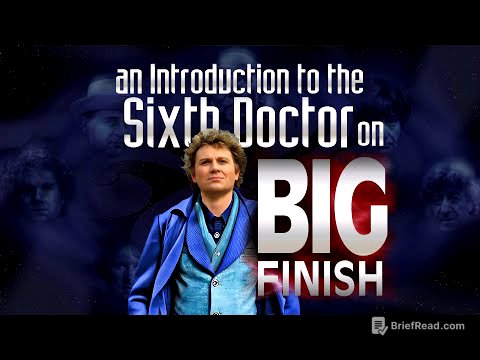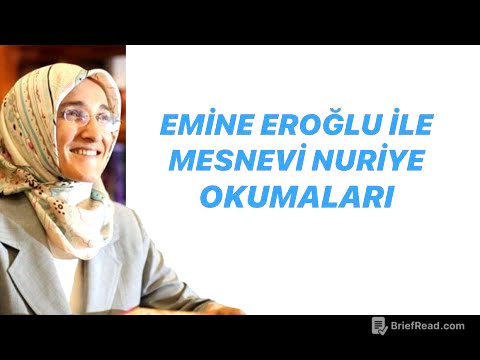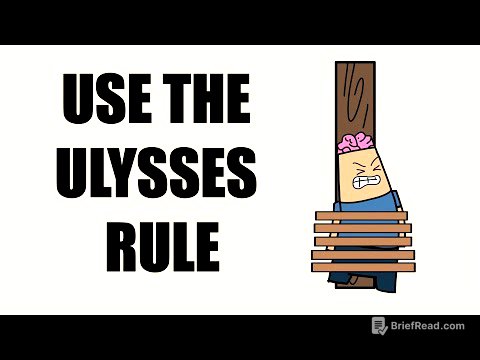TLDR;
This YouTube video features a discussion about pornography, sex, and masturbation addiction, offering solutions and motivations for recovery. It addresses the societal phenomenon of condemning the expression of denunciation more harshly than the act itself, the importance of acknowledging and naming the problem, and the impact of pornography on relationships, brain structure, and sexual function. The conversation also covers the role of family, environment, and public order in behavioral change, as well as strategies for relapse prevention and the importance of seeking professional help.
- The video provides insights into the science behind addiction.
- It offers practical advice for individuals struggling with pornography and masturbation addiction.
- It emphasizes the importance of community support and self-awareness in the recovery process.
Introduction [0:00]
The host introduces Dr. Mohamed Abdel Gawad, an addiction specialist, to discuss pornography, sex, and masturbation addiction. The goal is to provide real solutions and motivation for those struggling with these issues. The discussion aims to address these topics directly, using proper terminology, despite societal discomfort.
The Concept of Consciousness [4:00]
Dr. Abdel Gawad explains the origins of his "consciousness initiative," which began in August 2014. The initiative started as a personal endeavor to address sex and pornography addiction, a topic often avoided despite its importance. The initiative's success is measured by its continuity, development, and the team's self-reliance.
The Beginning of Awareness [5:00]
Dr. Abdel Gawad recounts how he became aware of sex and pornography addiction through a Coursera course and discussions on a Sharia forum. A comment from a Moroccan young man residing in the United States, who emphasized the scientific and medical perspective of compulsive addiction, sparked his interest. The young man recommended a blog called "A Feed The Right Wolf," which offered scientific explanations and solutions to the problem.
The Elephant in the Room [11:14]
The discussion highlights the importance of addressing pornography addiction directly, rather than avoiding the topic due to societal taboos. The analogy of "the elephant in the room" is used to illustrate how ignoring a significant problem only worsens it. The blog "A Feed The Right Wolf" is mentioned as a valuable resource, with plans to translate its content for the Arab world.
Three Perspectives for Behavioral Change [12:18]
Dr. Abdel Gawad emphasizes that behavioral change requires considering three perspectives: the individual's psychological perspective, the environmental perspective, and the public order perspective. He notes that pornography addiction is recognized as a serious issue in America, with terms like "visual cocaine" being used to describe its addictive nature.
Sex Addiction as a Behavioral Addiction [13:35]
Dr. Abdel Gawad shares his experience of studying sex addiction at Emory University, where he learned that it is considered a type of behavioral addiction. While not officially listed in the Diagnostic and Statistical Manual of Mental Disorders (DSM-5), sex addiction is recognized by the World Health Organization in the ICD-11. The term "addiction" is being replaced with "disorder" to reduce stigma.
The Story of Fairy Wolf [16:26]
Dr. Abdel Gawad revisits the story of "Fairy Wolf," emphasizing the impact of pornography addiction on individuals, even in America, where it is often perceived as a sexually open society. He highlights the negative feelings and sense of slavery that can result from crossing the limits of lowering one's gaze.
The Importance of Limits [18:43]
The discussion emphasizes that limits provide freedom, not restriction. Crossing the limits of lowering one's gaze leads to being a slave to lust. Similarly, exceeding the limits of staying up late leads to being a slave to bad behavior.
The Destruction of Sexual Freedom [20:16]
Dr. Abdel Gawad expresses surprise at the normalization of premarital sexual relationships among young people. He argues that sexual freedom can be destructive, as sexual energy is a powerful force that, when misdirected, can lead to self-destruction and addiction.
Brain Changes and Pornography [21:51]
Dr. Abdel Gawad discusses the brain changes that occur due to exposure to pornography, citing studies from Cambridge University and the Max Planck Institute. These studies show a shrinkage in the prefrontal cortex of the brain due to exposure to pornographic stimuli.
The Beginning of Treatment for Porn Addiction [22:46]
Dr. Abdel Gawad recounts how he started translating and publishing articles on pornography addiction in 2014, using WordPress and social media platforms. He received numerous cries for help and dedicated his free time to providing scientific information and support.
The Most Studied Mental Illness [25:23]
Addiction is described as the most studied mental illness, and the only one that can be created in the laboratory. Dr. Abdel Gawad's website now contains over 800 articles and 52 booklets on various topics related to pornography addiction.
Masturbation and Pornography [26:32]
The discussion explores the relationship between masturbation and pornography, noting that masturbation is more harmful when combined with pornography. Dr. Abdel Gawad mentions that some psychiatrists promote masturbation as harmless under certain conditions, but he argues that they are ignoring the connection between pornography and masturbation.
The Power of Imagination [28:56]
Imagination is highlighted as having the same effect on the brain as watching pornography. Dr. Abdel Gawad cites Norman Douche's book, "The Brain That Changes Itself," to support this claim. He also mentions Mark Salman's book, "The Millennium Drug," which states that masturbation causes a higher flood of dopamine than an intimate relationship.
Masturbation Addiction [31:04]
Dr. Abdel Gawad argues that masturbation is not just a secret habit, but an addiction. He notes that the modern generation often learns about masturbation through pornography, leading to early sexual arousal and addiction.
Pornography and the Internet [32:47]
The discussion emphasizes the role of the internet in pornography addiction, with the equation "Human Been Plus Internet Equal Porn Addiction." Dr. Abdel Gawad notes that the fast internet and smartphones have made pornography easily accessible, leading to a conditional association between masturbation and pornography.
Addiction: Loss of Control [34:22]
Addiction is defined as the loss of control, where negative consequences in life are ignored. Dr. Abdel Gawad argues that even masturbation without pornography can lead to addiction if it becomes a chronic disease that disrupts one's life.
Pornography and Relationships [35:57]
Pornography is described as destroying relationships and leading to depression and social isolation. Dr. Abdel Gawad notes that No Fab, a group fighting pornography, chose its name because they know that recovery requires stopping both pornography and masturbation.
The Loss of Sex Drive [37:57]
The discussion highlights that over 90% of people join the Nova group because of the loss of their sex drive. Pornography causes sexual adaptation, where natural things are no longer exciting, and leads to male sexual dysfunction and impotence problems.
The Brain as the Largest Sexual Organ [39:23]
The brain is identified as the largest sexual organ, with no erection or arousal occurring without an order from the brain's sex centers. Mary Ann Leyden's book on protecting children from pornography is mentioned, emphasizing that the question is not if a child will see pornography, but when.
The Addict Does Not Love [41:06]
It is stated that addicts do not love, and may have difficulty falling in love. Pornography creates a picture in the mind that makes it difficult for the brain to connect with a real person. This can lead to divorce and marital problems.
Pornography and Impotence [44:11]
Pornography is identified as a major cause of sexual dysfunction, including premature ejaculation, delayed ejaculation, and lack of sensation. Studies in Sweden and the American army have shown a link between pornography and increased sexual impotence.
The Link Between Pornography and Sexual Dysfunction [46:07]
Dr. Tariq Pasha, a male diseases specialist, is mentioned for his changed view on pornography-related sexual dysfunction. He now recognizes the strong relationship between pornography and impotence, based on scientific studies and the book "Your Brain On Bore."
Removing the Causative Factor [48:27]
The discussion highlights the difficulty of conducting scientific studies on pornography addiction due to the challenge of finding participants who are completely honest about their habits. However, studies that remove the causative factor (i.e., stopping pornography consumption) have shown significant improvement in sexual dysfunction.
False Talk About Masturbation [50:15]
Dr. Abdel Gawad debunks false claims about masturbation, such as the idea that it protects against prostate cancer. He emphasizes the importance of verifying information and avoiding news that supports bad habits.
The Lack of Education About Pornography [52:06]
The discussion highlights the lack of education about the dangers of pornography in educational curricula. Dr. Abdel Gawad notes that pornography addiction is a human problem, affecting both boys and girls, and leading to severe psychological illnesses.
Pornography and Marriage [53:41]
Pornography is described as turning people away from marriage and justifying continued bad behavior. It affects the prefrontal cortex of the brain, which is responsible for problem-solving, planning, decision-making, memory, and concentration.
Atheism and Pornography [55:57]
The discussion touches on the connection between atheism and pornography, citing Kevin Skinner's book on treating porn addiction. Skinner argues that extreme pornography can lead a person to atheism, as they question why they were put in such a situation.
Intimacy vs. Sex [58:51]
The discussion emphasizes that intimacy is not just about sex, but also about emotional connection and love. Pornography is promoted as a means of increasing love, but it actually kills love. Dr. Abdel Gawad explains that addicts often struggle to fall in love because pornography disrupts the brain's centers for emotional relationships.
The Importance of Emotional Relationships [59:47]
Emotional relationships are highlighted as essential for human well-being. Dr. Abdel Gawad cites scientific evidence that dopamine, when excessively released through pornography, interferes with the ability to establish long-term intimate relationships.
The Hole Inside [1:03:56]
The discussion describes the feeling of emptiness and the "hole inside" that results from a lack of intimacy. People often try to fill this hole with harmful behaviors like game addiction, drug addiction, and sex addiction, which only worsen the problem.
Intimacy is Not About Sex [1:05:45]
Intimacy is defined as possible through love relationships with family and friends, not just physical relationships. The discussion challenges the idea that marriage is solely about sex, emphasizing the importance of responsibility, care, and ability.
Instinct vs. Lust [1:07:22]
The difference between instinct and lust is explored, with lust being described as a desire that can be controlled. Dr. Abdel Gawad argues that pornography distorts the idea of marriage and can lead to dissatisfaction in real relationships.
The Importance of Stopping Pornography [1:09:31]
It is emphasized that stopping pornography and masturbation will create a strong motivation for marriage. Dr. Abdel Gawad advises young people to trust in God and allow their brains to reset by abstaining from pornography for a sufficient period of time.
The Role of Family [1:10:50]
The discussion highlights the importance of family in preventing and addressing pornography addiction. Kevin Skinner's division of families into controlling and neglected types is mentioned, emphasizing the need for strong awareness from the head of the family.
The Dilemma of the Youth [1:13:53]
The dilemma of young people facing pornography addiction alone is addressed. Dr. Abdel Gawad emphasizes the importance of understanding that addictive behavior is both fun and destructive, and that the losses do not appear until later in life.
The Importance of Alternatives [1:16:22]
Finding alternatives to pornography is highlighted as crucial for recovery. Dr. Abdel Gawad advises young people to engage in activities outside the home, such as sports and community involvement, to reduce stress and discover themselves without pornography.
The User vs. The Addict [1:18:13]
The distinction between a user and an addict is made, with the addict losing control and experiencing negative consequences in their life. Dr. Abdel Gawad emphasizes the importance of sports in reactivating the cortex and restoring its functions.
The Importance of Relationships [1:20:01]
Relationships are highlighted as very important for recovery. Dr. Abdel Gawad advises individuals to try to find the source of intimacy away from sex and to maintain a balance in their lives.
The Quick Prescription [1:21:51]
Dr. Abdel Gawad offers a "quick prescription" for recovery, emphasizing the importance of stopping the addictive behavior and replacing it with something else. He recommends cutting off exposure to sexual stimulants and blocking pornography sites.
Blocking is a Matter of Knowing What Brakes Are [1:23:49]
The discussion emphasizes that blocking pornography sites is a matter of knowing what brakes are, not bumps. Dr. Abdel Gawad notes that countries that block pornography sites have lower rates of pornography addiction.
Protecting Children [1:25:48]
The importance of protecting children from pornography is highlighted, as the adolescent brain is different from the adult brain. Exposure to pornography at a young age can lead to addiction and other problems.
The Blessing of Addiction [1:27:27]
Dr. Abdel Gawad shares a story of someone who viewed their addiction as a blessing because it led them to fix their personality. He notes that some companies require employees to be former addicts because of their self-control, discipline, and commitment.
The Importance of Self-Control [1:29:07]
Self-control and a strong will are highlighted as essential for recovery. Dr. Abdel Gawad emphasizes that addiction is a chronic disease that requires ongoing effort to manage.
Genetic Predisposition to Addiction [1:29:49]
The discussion touches on the genetic predisposition to addiction, noting that certain genes can increase the likelihood of falling into addiction. However, lifestyle choices and environmental factors also play a significant role.
The Importance of Blocking [1:31:14]
Dr. Abdel Gawad shares a story about a lecturer in Jordan who emphasized the importance of blocking pornography sites. He notes that even in countries with parental control options, blocking is essential to protect children.
The British School and Freedom
The discussion explores the concept of freedom in the context of pornography addiction. Dr. Abdel Gawad argues that unrestricted freedom can be harmful, especially for children and adolescents whose brains are still developing.
The Brain of Women and Children [1:33:18]
The brains of women and children are described as being more susceptible to the effects of pornography due to their love of curiosity and the higher secretion of dopamine. Dr. Abdel Gawad emphasizes the importance of parental authority in guiding children and protecting them from harm.
The Law of Saif Internet [1:35:42]
The discussion touches on the Law of Saif Internet in Britain, which aims to control who enters pornography sites. Dr. Abdel Gawad notes that this law is driven by concerns about violence against women and the need to protect children.
Porn: A Western Conspiracy? [1:37:56]
The question of whether pornography is a Western conspiracy is addressed. Dr. Abdel Gawad argues that the main motive behind pornography is financial gain, but that it also poses a public health crisis for everyone.
The Profits of Pornography [1:39:39]
The profits of the pornography industry are discussed, with Dr. Abdel Gawad noting that its profits have decreased due to the rise of free content and homemade videos. He emphasizes that the main engine of pornography is material gain.
The Need to Look at Pornography From a Broader Perspective [1:42:18]
Dr. Abdel Gawad emphasizes the need to look at pornography from a broader perspective, noting that it is not just about offering scenes or pictures, but also about applications and chatting. He highlights the dangers of sex chatting and the need to address this issue.
The Relapse Stage [1:45:27]
The relapse stage is described as the most difficult part of the recovery process. Dr. Abdel Gawad emphasizes the importance of not surrendering to relapse, but rather using it as an opportunity to learn and grow.
The Change Cycle [1:46:32]
The Change Cycle model is introduced, emphasizing the stages of change that individuals and communities go through when changing a behavior. Dr. Abdel Gawad highlights the importance of identifying the problem, preparing for change, and continuing to move forward.
Continuity, Not Perfection [1:49:15]
The discussion emphasizes the importance of continuity, not perfection, in the recovery process. Dr. Abdel Gawad argues that it is better to continue making progress, even with setbacks, than to stop altogether.
Relapse as an Opportunity [1:50:48]
Relapse is reframed as an opportunity for growth, rather than a failure. Dr. Abdel Gawad emphasizes the importance of analyzing what went wrong and developing a plan to prevent future relapses.
The Importance of a Plan [1:51:57]
The discussion highlights the importance of having a plan for recovery, including identifying triggers and developing strategies for dealing with them. Dr. Abdel Gawad emphasizes that addiction is a chronic disease that requires ongoing management.
The Importance of a Mobile Phone [1:54:06]
The importance of not taking a mobile phone to bed is highlighted as a simple change that can have a significant impact on recovery. Dr. Abdel Gawad notes that the blue light from screens increases cortisol levels and disrupts sleep.
The Importance of a Recovery Diary [1:57:49]
The importance of keeping a recovery diary is emphasized as a tool for tracking feelings, identifying triggers, and developing strategies for dealing with them. Dr. Abdel Gawad recommends free writing in the diary and focusing on positive words.
Analyzing Defeats
The discussion emphasizes the importance of analyzing defeats and learning from them. Dr. Abdel Gawad uses the example of Britain's success in occupying the planet to illustrate the power of analyzing failures and developing strategies for improvement.
Triggers [2:01:22]
Triggers are identified as key factors in relapse. Dr. Abdel Gawad highlights the importance of recognizing and avoiding triggers, such as loneliness, hunger, anger, tiredness, and loneliness.
Self-Care [2:04:08]
Self-care is emphasized as essential for recovery. Dr. Abdel Gawad recommends healthy eating, sports, and getting enough sleep.
The Brain Model [2:05:49]
A brain model is used to illustrate the functions of the prefrontal cortex and the reward circle. Dr. Abdel Gawad explains how dopamine and endorphins work in the brain and how addiction disrupts these processes.
The Reward Circle [2:07:31]
The reward circle is described as the emotional brain, responsible for feeling pleasure. Dr. Abdel Gawad explains how dopamine is released when achieving a goal and how this process is disrupted by addiction.
The Priorities [2:10:08]
The priorities of the brain are identified as food, sex, friendship, and love. Dr. Abdel Gawad explains how the brain will choose these things first, and how addiction can disrupt this natural order.
The Variable Rewards [2:11:30]
The concept of variable rewards is introduced, explaining how the brain is wired to seek out new and unexpected things. Dr. Abdel Gawad uses the example of the Skinner box to illustrate how variable rewards can lead to addiction.
The Black Hole [2:29:27]
Addiction is described as a black hole that sucks up energy and destroys lives. Dr. Abdel Gawad emphasizes the importance of having a plan to destroy addiction and not being random in the recovery process.
Tracking the Days [2:30:18]
The importance of tracking the days of recovery is highlighted as a way to stay motivated and focused on the goal. Dr. Abdel Gawad notes that the counter itself can have both advantages and disadvantages.
The Hour Hour [2:32:22]
The concept of tracking the hours of recovery is introduced, with Dr. Abdel Gawad noting that this can be particularly helpful for individuals who are struggling to control their thoughts and behaviors.
The Importance of Support Groups [2:33:20]
The importance of support groups is emphasized as a way to stay connected and motivated in the recovery process. Dr. Abdel Gawad notes that Waei offers live chat groups and the ability to choose a recovery partner.
Negative Beliefs [2:33:50]
The discussion highlights the role of negative beliefs in relapse. Dr. Abdel Gawad emphasizes the importance of challenging these beliefs and replacing them with rational thinking.
The Series of Reactions [2:34:50]
The series of reactions that lead to relapse is described, from the initial thought to the physical changes that occur in the brain. Dr. Abdel Gawad emphasizes the importance of recognizing these reactions and taking steps to interrupt them.
The Rescue Plan [2:37:44]
The importance of having a rescue plan is highlighted as a way to deal with cravings and triggers. Dr. Abdel Gawad recommends having a list of alternative activities to engage in when feeling tempted.
The Importance of Self-Care [2:38:43]
Self-care is emphasized as essential for recovery. Dr. Abdel Gawad recommends getting enough sleep, eating healthy food, and engaging in activities that bring joy and relaxation.
The Ideal Personality [2:39:19]
The discussion touches on the concept of the ideal personality, noting that it is important to be aware of one's values and to make decisions that align with those values.
The Alternative Plan [2:40:14]
The importance of having an alternative plan for pornography is emphasized. Dr. Abdel Gawad recommends having a "guardian of the list" to help stay accountable and avoid temptation.
The Importance of Support [2:41:29]
The importance of having support from friends, family, and colleagues is highlighted. Dr. Abdel Gawad recommends talking to someone you trust and seeking help when needed.
The Importance of Prayer [2:41:47]
The importance of prayer is emphasized as a way to relax the mind and seek guidance from God. Dr. Abdel Gawad notes that pornography increases depression and makes people more sensitive to situations.
Making Concessions
The discussion highlights the importance of making concessions and avoiding conflicts in the early stages of recovery. Dr. Abdel Gawad advises against making major decisions during this time, as brain chemistry is not stable.
Successful Models [2:43:26]
The importance of seeing successful models of recovery is emphasized. Dr. Abdel Gawad notes that Waei provides diaries and good news stories to inspire and motivate people.
The Importance of Community [2:44:39]
The importance of community and support groups is highlighted as a way to connect with others who understand the struggle of addiction. Dr. Abdel Gawad notes that Waei offers recovery groups and camps to provide support and accountability.
The Importance of a Daily Follow-Up [2:46:32]
The importance of a daily follow-up is emphasized as a way to stay on track and make progress in recovery. Dr. Abdel Gawad notes that Waei offers a program with competitions, motivation, and personalized feedback.
The Importance of a Paid Subscription [2:48:36]
The importance of a paid subscription is highlighted as a way to support the ongoing work of Waei and ensure that the organization can continue to provide its services.
The Importance of Affirming That You Are Addicted [2:50:17]
The importance of affirming that you are addicted is emphasized as a way to stay humble and avoid vanity. Dr. Abdel Gawad notes that it is important to continue preserving the sessions and recovery with support groups.
The Importance of a Good Lifestyle [2:51:56]
The importance of a good lifestyle is highlighted as a way to stay far from addiction. Dr. Abdel Gawad recommends changing bad habits and adopting good habits.
The Story of a 17-Year-Old Imprisoned for 13 Years [2:52:29]
Dr. Abdel Gawad shares the story of a 17-year-old imprisoned for 13 years who turned his life around by making proper decisions, eating healthy food, and keeping away from masturbation.
The Importance of Awareness Campaigns [2:54:49]
The importance of awareness campaigns in schools is highlighted as a way to educate young people about the dangers of pornography. Dr. Abdel Gawad notes that Waei has been conducting awareness activities in schools since 2016.
Gradual Recovery [2:57:44]
The discussion touches on the debate between stopping pornography addiction gradually versus stopping it all at once. Dr. Abdel Gawad argues that experience has proven that people who quit once are more successful than those who quit gradually.
The Importance of Not Exposing Yourself [2:59:36]
The importance of not exposing yourself to the source of excitement is emphasized as a way to keep the pathways in the brain active. Dr. Abdel Gawad uses the analogy of a path in the forest to illustrate how repeated exposure to pornography can strengthen the neural pathways associated with addiction.
How to Behave in the Family [3:03:21]
The discussion explores how to behave in the family when someone is discovered to be addicted to pornography. Dr. Abdel Gawad emphasizes the importance of talking to the person, educating them about the dangers of pornography, and providing support.
The Importance of Talking to Your Son [3:05:41]
Dr. Abdel Gawad recommends talking to your son about the dangers of pornography, using age-appropriate language and providing scientific information. He also recommends reading books and articles on the topic.
The Importance of a Long Conversation [3:18:24]
The importance of having a long conversation with the person is emphasized, rather than simply punishing them. Dr. Abdel Gawad notes that it is important to create a safe space for the person to talk about their struggles.









